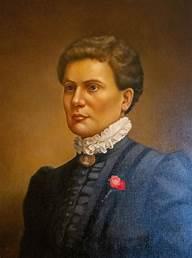Marilla Marks Young was born on March 18, 1840, to Hannah Young, a Free Will Baptist and freethinker Jonathan Young, in New Durham, New Hampshire. Her father encouraged her to think independently and be curious, often taking her to courtrooms and town meetings. She attended Colby Academy in New London and eventually became the first female lawyer from NH, paving the way for women to be accepted into the NH bar.
Since the age of sixteen, she had become a teacher in the towns of Dover and Lee. Refusing to read from the Bible during class, she preferred the literary works of Emerson. This brought the school committee who informed her she was required to read from the Bible in class. Ricker still refused and eventually left the teaching profession.
In 1863, Marilla Young married John Ricker, a man 33 years her senior, who passed away five years later. The inheritance left to the young widow made her financially independent.
Ricker then turned to studying law in Washington, DC, from 1876 to 1880, returning to NH in the summer. When Ricker and 16 men took the Washington, DC bar exam in 1880, she achieved the highest score. In 1884, she was appointed as a commissioner and examiner in a chancery, the first woman to achieve such an appointment. It didn’t take her to long before gaining prominence as a competent and compassionate member of the profession. During her career as a lawyer, Ricker became a strong advocate of prisoners' rights, eventually receiving the nickname "the prisoner's friend". In 1879, she sought a hearing to protest the conditions in state prisons.
After Ricker’s initial application to join the NH Bar was turned down, in 1890 it was granted on appeal to the NH Supreme Court. She was the first woman allowed to practice law in NH.
Going back to1869, a year after her husband's death, Ricker attended the first National Woman Suffrage Association convention, organized by Elizabeth Cady Stanton and Susan B. Anthony. This began her activist work as a suffragette.
Strongly declaring her belief in the equality of all peoples, Ricker acted upon these beliefs by attempting to vote in 1870 in her hometown of Dover, NH. She was the first woman to do so and although her ballot wasn’t counted, continued to hand in a ballot for consecutive decades until the end of her life.
In 1910, she attempted to become the first woman to run for governor in NH, knowing she’d be barred from doing so, not being recognized as a registered voter. “I’m running for governor in order to get people in the habit of thinking of women as governor… People have to think about a thing for several centuries before they can get acclimated to the idea. I want to start the ball a’rolling. There isn’t a ghost of a reason why a woman should not be governor or president if she wants to be and is capable of it.”
According to Ricker, if women “can be hanged under the laws, they should have a voice in making them.” Although the Constitution only declared governors must be above age 30 and have lived in the state for at least 7 years, the attorney general ruled her candidacy illegal due to her gender. She continued to step aside for male counterparts, stating her goal was “to get the people of NH used to thinking about a woman for governor.”
As an aside, it took 82 more years for a woman (Arnie Arnesen) to receive a major party nomination for governor, and 86 more years for a woman (Jeanne Shaheen) to be elected to the governorship.
During the 1910s, Ricker remained in NH concentrating on publishing articles and books clarifying her freethought beliefs. A lot of her writing centered on the dangerous influence of the church on society. "A steeple is no more to be excluded from taxation than a smoke stack.”
A portrait of Marilla Ricker now hangs in the State House.
“Let come what will come, no man, be he priest, minister or judge, shall sit upon the throne of my mind, and decide for me what is right, true, or good.”
Marilla Ricker

